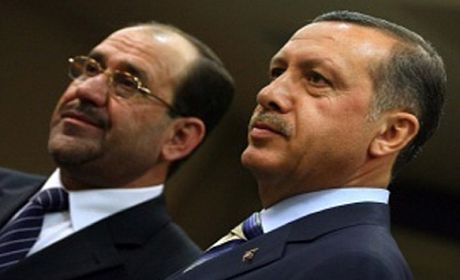Confrontation between Sunnis and Shiites, Trouble for Neighbors

During the past few days, there were tensions in relations between Turkey and Iraq to the extent that the spokesman for Iraq's Foreign Ministry stated that his country would review its relations with Turkey. In order to assess Iraq-Turkey relations and the tensions created between the two countries during the past year, we should go back and study Turkey's approach since the outset of US attacks against Iraq in 2003.
In 2003, when the US organized its attack against Iraq, Turkey opposed this action. Among the signs of this opposition was that it did not allow the US to use its territory for an attack against Iraq. The reason was that Turkey did not feel threatened by the ruling regime of the time and its conditions. However, following the US attack against Iraq, Turkey's concern grew over the direction of Iraq's developments. The situation of the Iraqi Kurds was the most important security concern of Turkey with regard to Iraq. Turkey made great efforts to remove its concern through different measures, including entering Iraq's territory and targeting PKK forces that were in northern Iraq.
But at one juncture, Turkey reached the conclusion that a security approach by itself would not be enough with regard to Iraq's developments. Therefore, it began serious political and economic interactions with Iraq's central government during the first presidency of Nouri al-Maliki, which improved relations between the two countries on one hand, and attempted to create economic relations with the Iraqi Kurds to expand Turkey's influence in northern Iraq on the other. But during the past year, serious tensions have been created between Turkey and Iran.
It seems that one of the reasons behind these tensions is the new stage of the region's developments. It is in this stage that tensions between Turkey and Iraq find meaning. From the viewpoint of the Iraqi government, Turkey has adopted a hostile approach with regard to Iraq during the past year and it attempts to disturb the political order in Iraq, taking measures to damage Iraq and threaten the political stability of this country. At the present time, Turkey has given asylum to Tariq al-Hashimi, a person who the Iraqi government believes had relations with terrorist groups. Turkish officials constantly criticize Iraqi officials and the government of Nouri al-Maliki. On the other hand, Turkey has commenced certain kinds of interactions with the Kurds of northern Iraq which, according to Baghdad, has challenged the governance of this country. Buying oil from northern Iraqi Kurds or the Turkish Foreign Minister's visit of Kirkuk are among the measures considered by Baghdad as Turkey's negative and hostile actions. It is on this basis that the idea of reviewing relations with Turkey has been proposed.
Besides bilateral issues, other matters such as developments in Syria have also been involved. As it is well known, Turkey strongly supports regime change in Syria and, considering its long borders with Syria, it has supported armed opponents of Bashar Assad. This is while the government of Iraq considers that these measures disturb the stability of the region and the domestic stability of Iraq and opposes them. These contradicting approaches with regard to Syria have added to bilateral differences and have intensified the tensions. It seems that Turkey, under these new conditions, intends to expand its influence in Iraq in addition to Syria and it supports certain changes in this country which would lead to expansion of its influence.
At a higher level, differences between the Shiites and the Sunnis must also be considered. Although Turkey apparently denies the impact of these differences on its regional foreign policy, this discussion exists in lower levels of Turkey's foreign policy. Turkey attempts to improve the position of the Sunnis in Iraq and Syria. This issue is directly related to the rivalry between the Shiites and the Sunnis. The impact of this factor cannot be ignored, even though this discussion exists in the lower and secret levels of Turkey's foreign policy.

